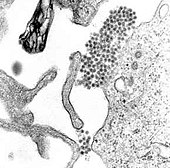Robert Shope

Robert Ellis Shope (February 21, 1929
Biography
Born in 1929 in
Returning to the US in 1965, Shope joined the recently established Yale Arbovirus Research Unit (YARU) at Yale School of Medicine with other virologists from the Rockefeller Foundation. Initially an associate professor, he rose to direct the unit for 24 years.[2][5][6][7] Shope also headed the university's Division of Infectious Disease Epidemiology.[5] After his retirement from Yale in 1995, Shope and his colleague Robert B. Tesh moved to the University of Texas Medical Branch at Galveston, Texas, where they founded a new arbovirus centre.[3][5][6][7][8] Shope subsequently held the university's John S. Dunn Distinguished Chair in Biodefense.[1][5]
Research

The virologist
Shope initially studied the Australian disease then known as "
Later that decade while at YARU, he characterised novel arboviruses from birds in Egypt. In 1969, his research turned to outbreaks of
During Shope's time at Yale, YARU became the global repository for arboviruses.[7][8] When he and Tesh moved to University of Texas Medical Branch in 1995, they brought the arbovirus collection – consisting of more than 4,000 strains of arbovirus and more than 1,000 other viral strains, as well as reagents such as antibodies – with them.[2][3][5][7][8] The collection is used by scientists internationally to identify virus strains.[7][8] At Galveston, Shope widened his focus to include bioterrorism, winning $3.7 million in funding to develop measures to counter the threat. His group identified alphavirus, arenavirus and flavivirus as potential bioterrorist risks, and Shope worked with structural biologist David Gorenstein to develop new small-molecule antivirals targeted against these viruses.[1][2][3][7]
Public health and advisory work
The medical community and society at large have tended to view acute infectious diseases as a problem of the past. But that assumption is wrong. We claimed victory too soon.
— Robert Shope (1992), [1]
Shope led a high-profile investigation, with Joshua Lederberg and Stanley Oaks, into the risks posed by emerging infectious diseases and the measures necessary to respond to them for the Institute of Medicine. The findings were published in 1992 as Emerging Infections: Microbial Threats to Health in the United States, with Shope as the principal author, and the publication was swiftly recognised as groundbreaking. It suggested that the success of vaccines and antibiotics had led to the threat of infectious diseases being underestimated.[2][3][12][13] Shope stated at the press conference announcing the report's publication: "The medical community and society at large have tended to view acute infectious diseases as a problem of the past. But that assumption is wrong. We claimed victory too soon."[1] The report was important in improving the detection of infectious diseases in the US, and has been credited with stimulating renewed global interest in the area.[2][3][12][13] Shope continued to advise the US government on the topic later in the 1990s, and contributed to the establishment of American and international surveillance programs for infectious diseases including ProMED.[1]
Shope was one of seven scientists to brief
Personal life
Shope was married to Virginia; the couple had two sons (Peter and Steven) and two daughters (Deborah and Bonnie). He had idiopathic pulmonary fibrosis, for which he received a lung transplant in December 2003. He died the following month in Galveston, from complications from the operation, at the age of 74.[2][3]
Societies, awards and honours
Shope served as president of the American Society of Tropical Medicine and Hygiene (ASTMH) in 1980.[2][14] He was awarded the society's Bailey K. Ashford Medal (1974),[15] Richard M. Taylor Award (1987)[16] and Walter Reed Medal (1993).[17] In 2005, ASTMH established the Robert E. Shope International Fellowship in Infectious Diseases in his memory.[9] The University of Texas Medical Branch named its biosafety level 4 laboratory, completed just before his death, The Robert E. Shope, M.D. Laboratory, and also set up a fellowship in his memory.[2][18] A symposium was held in his honour on March 18–21, 2004.[10]
References
- ^ S2CID 54366756
- ^ PMC 3323084
- ^ New York Times, retrieved January 29, 2016
- ^ Obituaries, American Veterinary Medical Association, September 28, 2011, retrieved March 4, 2016
- ^ a b c d e f g h "In Memoriam: World Renowned Authority on Infectious Diseases, Robert E. Shope", YaleNews, Yale University, February 4, 2004, retrieved January 29, 2016
- ^ PMID 15228809
- ^ S2CID 33194987
- ^ PMID 7985009
- ^ a b Robert E. Shope: International Fellowship in Infectious Diseases: Application Guidelines (PDF), American Society for Tropical Medicine and Hygiene, retrieved January 29, 2016
- ^ ISBN 978-3-211-29981-4
- JSTOR 3964604
- ^ ISBN 978-0-7817-6060-7
- ^ ISBN 978-0-8261-1474-7
- ^ Membership Directory (PDF), American Society for Tropical Medicine and Hygiene, retrieved January 29, 2016
- ^ Bailey K. Ashford Medal, American Society of Tropical Medicine and Hygiene, retrieved March 1, 2016
- ^ American Committee on Arthropod-Borne Viruses (ACAV), American Society of Tropical Medicine and Hygiene, retrieved March 1, 2016
- ^ Walter Reed Medal, American Society of Tropical Medicine and Hygiene, retrieved March 1, 2016
- ^ Safety and Biocontainment: The Robert E. Shope, MD, Laboratory in the John Sealy Pavilion for Infectious Diseases Research, University of Texas Medical Branch, archived from the original on January 5, 2016, retrieved March 2, 2016
